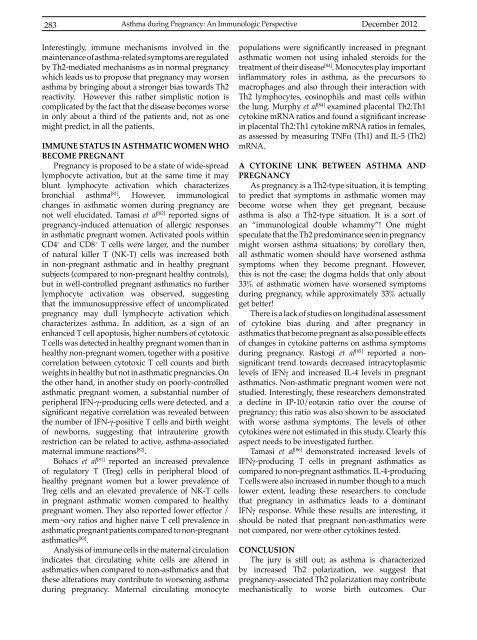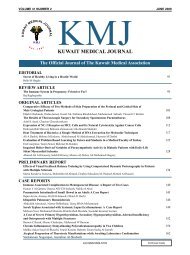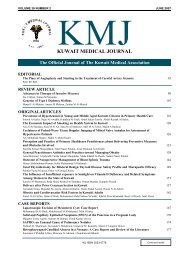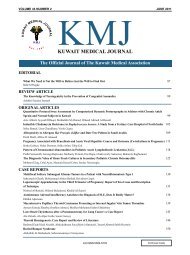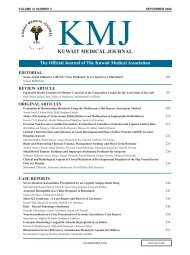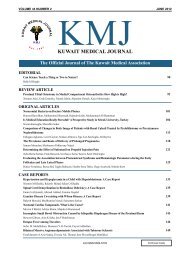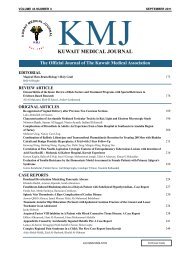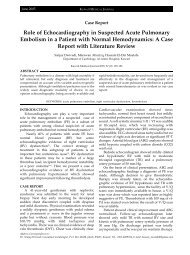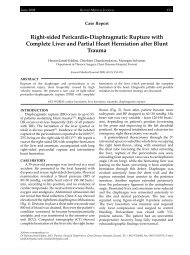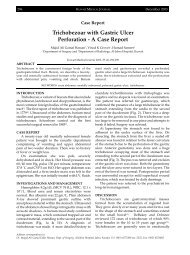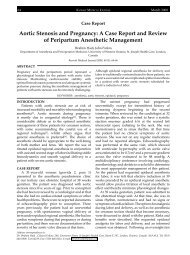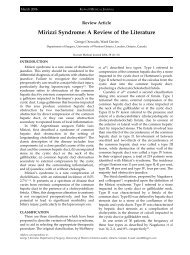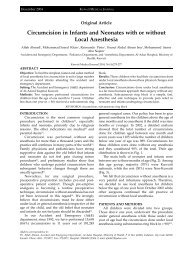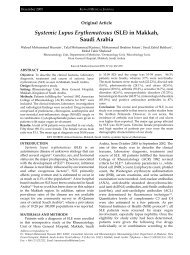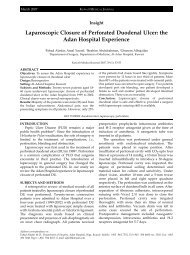Vol 44 # 4 December 2012 - Kma.org.kw
Vol 44 # 4 December 2012 - Kma.org.kw
Vol 44 # 4 December 2012 - Kma.org.kw
Create successful ePaper yourself
Turn your PDF publications into a flip-book with our unique Google optimized e-Paper software.
283<br />
Asthma during Pregnancy: An Immunologic Perspective<br />
<strong>December</strong> <strong>2012</strong><br />
Interestingly, immune mechanisms involved in the<br />
maintenance of asthma-related symptoms are regulated<br />
by Th2-mediated mechanisms as in normal pregnancy<br />
which leads us to propose that pregnancy may worsen<br />
asthma by bringing about a stronger bias towards Th2<br />
reactivity. However this rather simplistic notion is<br />
complicated by the fact that the disease becomes worse<br />
in only about a third of the patients and, not as one<br />
might predict, in all the patients.<br />
IMMUNE STATUS IN ASTHMATIC WOMEN WHO<br />
BECOME PREGNANT<br />
Pregnancy is proposed to be a state of wide-spread<br />
lymphocyte activation, but at the same time it may<br />
blunt lymphocyte activation which characterizes<br />
bronchial asthma [81] . However, immunological<br />
changes in asthmatic women during pregnancy are<br />
not well elucidated. Tamasi et al [82] reported signs of<br />
pregnancy-induced attenuation of allergic responses<br />
in asthmatic pregnant women. Activated pools within<br />
CD4 + and CD8 + T cells were larger, and the number<br />
of natural killer T (NK-T) cells was increased both<br />
in non-pregnant asthmatic and in healthy pregnant<br />
subjects (compared to non-pregnant healthy controls),<br />
but in well-controlled pregnant asthmatics no further<br />
lymphocyte activation was observed, suggesting<br />
that the immunosuppressive effect of uncomplicated<br />
pregnancy may dull lymphocyte activation which<br />
characterizes asthma. In addition, as a sign of an<br />
enhanced T cell apoptosis, higher numbers of cytotoxic<br />
T cells was detected in healthy pregnant women than in<br />
healthy non-pregnant women, together with a positive<br />
correlation between cytotoxic T cell counts and birth<br />
weights in healthy but not in asthmatic pregnancies. On<br />
the other hand, in another study on poorly-controlled<br />
asthmatic pregnant women, a substantial number of<br />
peripheral IFN-γ-producing cells were detected, and a<br />
significant negative correlation was revealed between<br />
the number of IFN-γ-positive T cells and birth weight<br />
of newborns, suggesting that intrauterine growth<br />
restriction can be related to active, asthma-associated<br />
maternal immune reactions [82] .<br />
Bohacs et al [81] reported an increased prevalence<br />
of regulatory T (Treg) cells in peripheral blood of<br />
healthy pregnant women but a lower prevalence of<br />
Treg cells and an elevated prevalence of NK-T cells<br />
in pregnant asthmatic women compared to healthy<br />
pregnant women. They also reported lower effector /<br />
mem¬ory ratios and higher naive T cell prevalence in<br />
asthmatic pregnant patients compared to non-pregnant<br />
asthmatics [83] .<br />
Analysis of immune cells in the maternal circulation<br />
indicates that circulating white cells are altered in<br />
asthmatics when compared to non-asthmatics and that<br />
these alterations may contribute to worsening asthma<br />
during pregnancy. Maternal circulating monocyte<br />
populations were significantly increased in pregnant<br />
asthmatic women not using inhaled steroids for the<br />
treatment of their disease [84] . Monocytes play important<br />
inflammatory roles in asthma, as the precursors to<br />
macrophages and also through their interaction with<br />
Th2 lymphocytes, eosinophils and mast cells within<br />
the lung. Murphy et al [84] examined placental Th2:Th1<br />
cytokine mRNA ratios and found a significant increase<br />
in placental Th2:Th1 cytokine mRNA ratios in females,<br />
as assessed by measuring TNFα (Th1) and IL-5 (Th2)<br />
mRNA.<br />
A CYTOKINE LINK BETWEEN ASTHMA AND<br />
PREGNANCY<br />
As pregnancy is a Th2-type situation, it is tempting<br />
to predict that symptoms in asthmatic women may<br />
become worse when they get pregnant, because<br />
asthma is also a Th2-type situation. It is a sort of<br />
an “immunological double whammy”! One might<br />
speculate that the Th2 predominance seen in pregnancy<br />
might worsen asthma situations; by corollary then,<br />
all asthmatic women should have worsened asthma<br />
symptoms when they become pregnant. However,<br />
this is not the case; the dogma holds that only about<br />
33% of asthmatic women have worsened symptoms<br />
during pregnancy, while approximately 33% actually<br />
get better!<br />
There is a lack of studies on longitudinal assessment<br />
of cytokine bias during and after pregnancy in<br />
asthmatics that become pregnant as also possible effects<br />
of changes in cytokine patterns on asthma symptoms<br />
during pregnancy. Rastogi et al [85] reported a nonsignificant<br />
trend towards decreased intracytoplasmic<br />
levels of IFNγ and increased IL-4 levels in pregnant<br />
asthmatics. Non-asthmatic pregnant women were not<br />
studied. Interestingly, these researchers demonstrated<br />
a decline in IP-10/eotaxin ratio over the course of<br />
pregnancy; this ratio was also shown to be associated<br />
with worse asthma symptoms. The levels of other<br />
cytokines were not estimated in this study. Clearly this<br />
aspect needs to be investigated further.<br />
Tamasi et al [86] demonstrated increased levels of<br />
IFNγ-producing T cells in pregnant asthmatics as<br />
compared to non-pregnant asthmatics. IL-4-producing<br />
T cells were also increased in number though to a much<br />
lower extent, leading these researchers to conclude<br />
that pregnancy in asthmatics leads to a dominant<br />
IFNγ response. While these results are interesting, it<br />
should be noted that pregnant non-asthmatics were<br />
not compared, nor were other cytokines tested.<br />
CONCLUSION<br />
The jury is still out; as asthma is characterized<br />
by increased Th2 polarization, we suggest that<br />
pregnancy-associated Th2 polarization may contribute<br />
mechanistically to worse birth outcomes. Our


